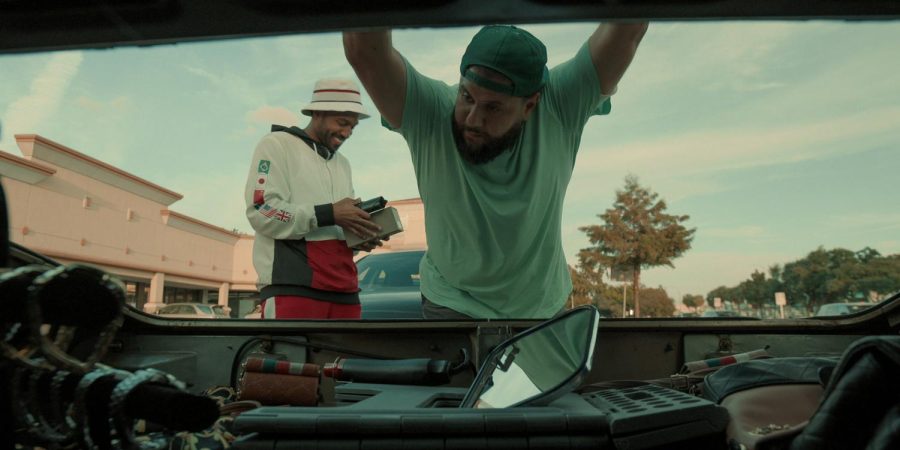Netflix’s ‘Mo’ explores life as a Palestinian refugee living in America
September 16, 2022
“We carry on,” proclaims Yusra Najjar to her son, the eponymous Mo in Netflix’s new episodic dramedy. The line, which lands near the beginning of the season’s eighth and final episode, would be hackneyed, were it not for what follows.
“That’s what we do, us Palestinians. We carry on,” concludes Yusra, capping an extraordinary monologue that answers the show’s core dilemma: how to live as a people erased.
“Mo,” played by Mohammed Amer, follows a jovial, hilarious, undocumented Palestinian-American Muslim living in the Alief neighborhood of Houston, navigating life and outside-of-the-faith love in the penumbra of a 22-year-old asylum request.
It was co-written by the comics Mohammed Amer and Ramy Yousseff, the latter of which is the titular star of Hulu’s “Ramy.” The two shows tell semi-autobiographical tales about young, millennial men trying to live in the hyphenated space between Muslim and American. Unlike “Ramy,” which has been met with controversy, “Mo” is a subversive achievement, even when it fails.
Palestine doesn’t exist, as far as the United States is concerned. Its people do, its authority does, but they and it reside in territories, not a country. These facts burden the show with the unfair expectations of representation, but they hardly hamper it. As Arwa Mahdawi, who is of Palestinian heritage, wrote in The Guardian, “It’s a groundbreaking piece of television.”
The series begins more than two decades after Mo, his mother and brother fled Saddam Hussein’s 1990 invasion of Kuwait. In the first episode’s opening minutes, Mo loses his job at a mobile phone shop because of an impending ICE raid.
“My asylum case is coming up soon,” Mo says to his boss in protest.
“How long have you been waiting? Twenty years?”
“Twenty-two, actually. Twenty-two years,” Mo intones.
The scene complicates the idea of a refugee and the people so named. He and his family may have fled war, yes, but now they are forced to flee the government they fled to for protection. Applying for asylum from whom, a watcher might wonder.
Beyond the heartbreaking, bureaucratic absurdity of his long wait, the other striking element of this scene is that it unfolds, like the entire show, in three languages: Arabic, English and Spanish.
The eponymous Mo is fearless, loping with good humor through Houston’s scrubland of gas stations and strip malls, hanging out in hookah bars or in his mom’s kitchen, fleeing amputee drug kingpins or cantankerous cartel members.
All of these scenes pop off the screen, in part, because of Solvan “Slick” Naim, an Algerian-American rapper, actor, writer and the show’s only director. His style is subtle, combining a mixture of grainy earth tones and wide screen shots that evince the early days of television, as if to say, “these characters are as American as any others.”
Precarity is a perennial presence throughout the show. After he loses his job, Mo flits between hawking high-end knock-off Yeezy’s, which apparently possess orthopedic qualities; DJing at Dream, a seedy strip club frequented by disinterested ICE agents; and picking olives, which is symbolism as heavy handed as the field work is back breaking. The olive oil Mo’s mother makes, and which he carries around everywhere, comes to symbolize loss, resilience and the variegated meaning of the words ‘home’ and ‘land.’
This hustling sends Mo careening across Houston, resplendent in its desert yellows and reds and oranges, but also into silly subplots that betray Amer’s anxiety about the show’s political preoccupations devolving into what he has called “trauma-porn.”
The titular character is studiously written to avoid the myth of the model immigrant. Mo can be stubborn, pugnacious, thoughtless, impetuous and crass. Like all human beings, Mo is messy – and the writing can be, too. After an early season gunshot wound, he develops a dependence on lean, a mixture of codeine and syrup. The addiction is never fully interrogated, which is disappointing, but it doesn’t undercut the show’s power. Some traumas take time to surface, just as the skills to communicate them do.
If the show has a problem, it’s that it fears its own sensibilities. But if this season is any indication, these missteps are not an indictment of talent but of time. Amer and Yousseff just haven’t been writing television for that long.
Before Yusra gives her speech, she announces to Mo that the family is starting an olive oil business. They’re naming it 1947, to honor the year before the Nakba, or catastrophe, when 700,000 Palestinians were displaced from their lands.
Mo knows better than anyone that you can’t always go backwards, but, like his mother, he also plans to push forwards and on. Here’s to hoping he has more seasons to explain where he’s going.






